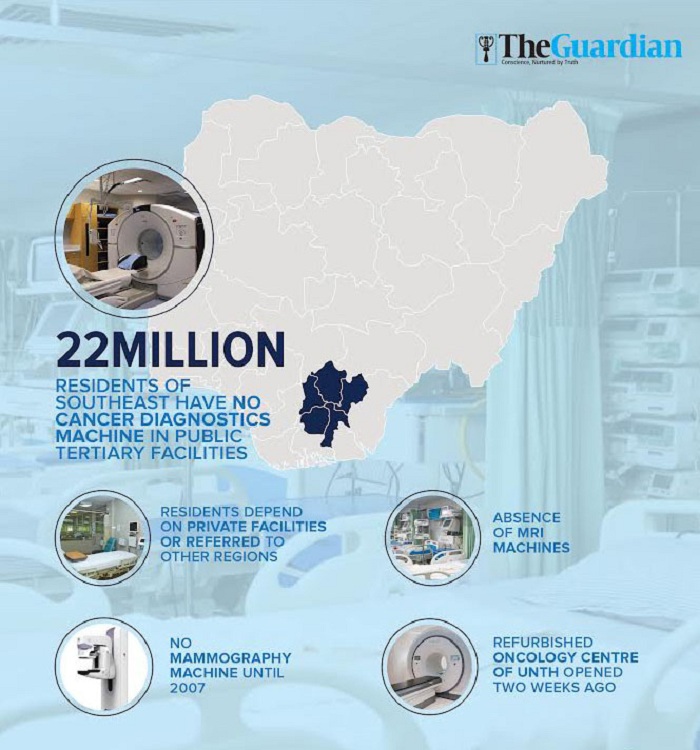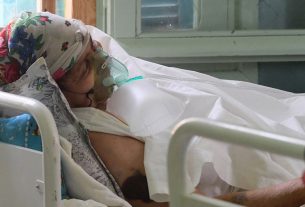• 22 million residents in five states depend on UNTH, Ibadan, north, Lagos public hospitals
• A woman dies of breast cancer every 68 seconds
• UNTH oncology centre now has better equipment, says Lasebikan
The fight against cancer, especially in the area of prevention and treatment, may be far from being won due to the challenge of access to diagnostic services by many Nigerians, especially those in the Southeast region.
Notwithstanding cancer accounting for the death rate of 78,000 people yearly in Nigeria, public hospitals in the southeast geo-political zone currently cannot boast of a Magnetic Resonance Imaging (MRI) machine for the detection of the disease.
Sources stated that the five states of the southeast region may account for about 13 percent (10,000) of the yearly death rate from cancer, which Oncologists confirmed recently to be on the rise due to a variety of factors including lifestyle, consumption of processed foods, diets, smoking, alcohol intakes and consumption of multiple starchy foods.
An investigation by The Guardian revealed recent efforts in refurbishing and equipping the University of Nigeria Teaching Hospital (UNTH), Enugu, as a focal cancer care centre for the region. But the region with about 22 million population and premier health institutions like Nnamdi Azikiwe University Teaching Hospital (NAUTH), Awka, Anambra state, have continued to refer cancer cases requiring thorough medical examination to private facilities in Enugu or public tertiary facilities in Lagos, Ibadan as well as to the Northern parts of the country.
While the region grapples with the negative effect of the absence of the MRI facility in the public tertiary hospital, it was further learned that one of the cancer detection machines, mammography, was not in any tertiary hospital in the zone until 2007.
MRI is a non-invasive imaging technology that produces three-dimensional detailed anatomical images. It is often used for disease detection, diagnosis, and treatment monitoring. It is used to investigate or diagnose conditions that affect soft tissue such as tumors or brain disorders.
While the procurement of a modern MRI machine is put at billions of naira, alongside the monthly maintenance cost, accessing the service in the private facility in the southeast region is prohibitive due to cost, thus removing it from the reach of the ordinary people.
A Professor of Radiology at the University of Nigeria, Nsukka (UNN), Prof Ifeoma Okoye, while lamenting the development stated: “Is it not shameful that UNTH, one of the three first generation, premier teaching hospitals in Nigeria is today still without an MRI? I have wept in the office of our representative senators from the southeast, in the National Assembly, for them to come over to Macedonia and help us… yet no result.
“We have continued to refer patients to where they can get the service, especially when you need to be sure of the disease. So, it is not as if we don’t have the right manpower, but the right facilities that will aid diagnosis are not available”, she stated.
Unfortunately, the UNTH, Enugu is the only centre of excellence approved by the federal government to handle cancer cases in the southeast region. All other federal government hospitals in the southeast make referrals of cancer cases to the Oncology unit of the UNTH.
Efforts to obtain the number of patients referred from states in the zone to the UNTH daily or weekly requiring diagnosis failed; but a hospital source stated that “We have patients on a daily basis who come here for examination from various states in the southeast”.
Lamenting that the absence of the machine has compounded the cure for cancer, especially breast cancer, Okoye, stated that every 68 seconds, a woman dies from breast cancer, stressing that breast cancer is the most common type of cancer in women, accounting for one out of every three cancers diagnosed.
Decrying the development, a Public Health Specialist, Dr Greg Ogbuisi, stated that the mortality rate of cancer would remain high in the southeast region as long as diagnosis and cure are not readily affordable.
Insisting that poverty had been the underlying factor behind the inability of residents to access medical care at the right time and place, he stated that the provision of basic diagnosis and treatment facilities for cancer patients would improve interest in public hospitals.
“I think the well-to-do individuals in the southeast region should support the effort to tackle some of these diseases that have proven to be money-consuming. I do not know the number of people in this region who can afford cancer care. But there should be an opportunity to subsidize the treatment and you can only do this when the facility is available in a government hospital, not private. So, it is a big challenge when the public institution does not have it”, he stated.
But the Director of the Oncology Centre, UNTH, Enugu, Dr. Nwamaka Lasebikan, who agreed that the MRI machine would always do a better job than the CT scan machine currently in use at the hospital, disclosed that a lot of efforts have been put to enhance treatment of the disease at the facility.
“UNTH has most of the diagnostic imaging available. We have a system where we can track the patient and get a report in a timely manner. When you talk about providing a cure for cancer patients, let’s be clear that a cure can only happen when patients present with early stages, and when they present with early disease it can conform with the treatment plan presented by their doctors.
“Here in UNTH, we have the full complement of treatment that is required for cancer patients. We have surgery which is often the mainstay. We have our surgical Oncologists who are trained. We have a state-of-the-art radiotherapy centre, which is the only one in the southeast. We also have specialists who are trained in the delivery of cancer patients; whether it is chemotherapy or the rest.
“In terms of the diagnosis, the Oncology centre which was refurbished and launched is a melting point of the specialties that are required to treat a patient that has cancer. We have radiologists; we have a new CT Scan machine, which can detect cancer. We currently do not have an MRI but that service is here in Enugu.
“MRI gives better resolution. You can use it to diagnose cancer or tumors easily in a clearer form than a CT scan. MRI will give you better soft tissues than any other for tissues within the pelvis. It looks at the tissue in a better form and deciphers what it is. So, it is a better facility and more reliable than any other facility you can think of in terms of diagnosis. We think that having it will go a long way in solving issues of cancer and helping in what we are doing”, she added
In an interview with The Guardian, the former President of the West African College of Surgeons, Emeritus Prof Okechukwu Mbonu, explained that residents of the southeast suffering from cancer had been patronising the federal facility at Ibadan.
Mbonu, who spoke to The Guardian shortly after the refurbished Oncology Centre of UNTH was formally opened two weeks ago added: “Now, we have a comprehensive centre. There is a linear accelerator. It is a comprehensive centre. The only thing remaining is the halls where people in their terminal stages can come and they will be looked after. I am told there is a plan to set it up. The laboratories are available.
“I am aware that there is no MRI machine in the centre, especially being a tertiary centre for the southeast. It has so many implications but some private hospitals have it. I know there is a plan to procure one with the help of the private sector. It will really boost this place because what they have here is more comprehensive than any other facility in the country” he said
On his part, the Chief Medical Director, of the Federal Medical Centre, Umuahia, Azubuike Onyebuchi stated that adequate healthcare facilities would help tackle the rate at which experts leave the country for greener pastures.
He stated that the hospital had always referred its cancer cases to the UNTH, Enugu, “because it is the only one empowered to handle such cases in the region due to its complex nature”.
He added that treatment of the disease was very expensive and may not be afforded by many, hence the rise in cases of the disease in the region.
The Guardian







